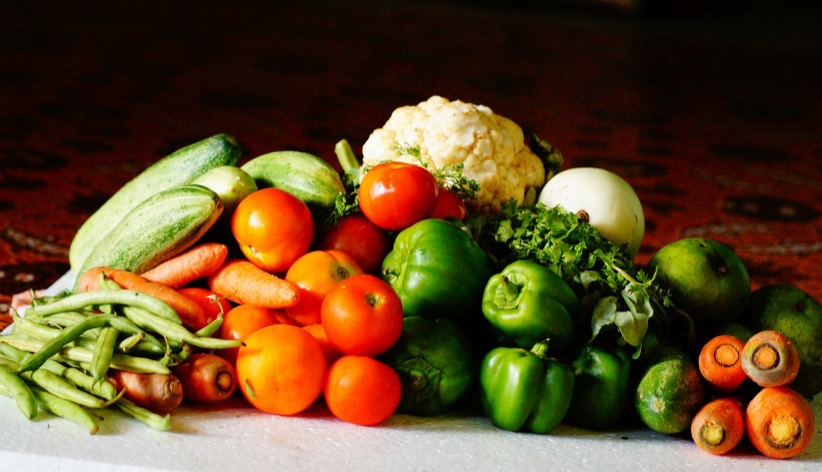When struggling with excess weight, you should keep in mind that the success will be more durable if you prolong the process of weight loss. Unfortunately, quite often people, after taking decisive measures and quickly losing weight, gain their pounds back by returning to their old diet and lifestyle.
Only a strong psychological adjustment to moderate food limitations and increase of physical activity ensures a reliable weight loss effect. Perhaps it is better to start with the simplest thing: try to eat slower.
Critically examine your menu. Is your meal too large or not? Does it contain sugar, salt, pepper and vinegar? Do you abuse processed food, fats, canned food, and bread? Do you eat enough fruits and vegetables?
Changing your eating habits is much easier than most people think it is. You should not worry about the fact that your diet will become less abundant and diverse than it was before. It must be healthier and that’s the point. Moreover, it is also recommended to practice intermittent fasting every once in a while.
Proper nutrition – is the basis of human health. It is the food that we take that ensures the development and continuous renewal of body cells and tissues, and becomes a source of energy that our body spends not only during physical activity but also at the state of rest. Food is the source of materials from which enzymes, hormones and other regulators of metabolic processes are synthesized. The metabolism, which is the base of the human body’s vital functions, relies on your diet.
As you can see, nutrition by itself provides all the vital functions of the body. The composition of the food, its quality, and quantity determine the growth and physical development, disease, neuro-psychological condition and life expectancy.
Food should contain a sufficient amount of vital substances: proteins, fats, carbohydrates, vitamins, minerals… Note: sufficient, but not excessive. And in the right proportions. In fact, all the theories of a balanced diet are aimed at solving this problem. In this section, I’m going to describe in detail, so to speak, a traditional, classic view at the proper, healthy diet.
Nutrition Rules

Remember: your state of health and, hence, the life expectancy depend by 15-20% on the genetic factors, by 20-30% on the environment, by 40-50% on how you live (and the food – it is an integral part) and by 10% on physicians.
So do not forget about the following rules: the main nutrition principle is moderation in everything while the main trend is to reduce of the daily calorie intake to a rational one. The main principle for the proper construction of your diet is a food variety.
You should eat the kind of amount of food that would cover energy costs. After the meal, you may even feel a little hungry, but that’s okay. Do not violate the main diet rules (eat in accordance with your biorhythm, mostly daily). Include a lot of fruits, vegetables, and berries in your everyday diet.
It is recommended to exclude refined foods, especially sweet dishes. It is desirable to eliminate fried foods and reduce salt intake to 4-6 grams per day. Your appetite is an instinct and at the same time, it is a habit. And while your appetite is a feeling of natural hunger, imposed habits dictate the time of meal intake.
So, you should differentiate between the sense of natural hunger and the appetite caused by habit. The increase of appetite may be also caused by an abundant amount of food. You should wait for the appetite to appear since the food without the feeling of hunger is less nutritious.
During your meal, it is recommended to stick to the following rules: do not eat immediately after waking up and less than 2-3 hours before heading to sleep, while the intervals between meals should be around 3 hours.
It is not recommended to take food in the state of physical or mental fatigue; if you happen to experience physical or mental fatigue, before the meal you should have a rest because the digestion process itself requires lots of energy.
It is better to eat in the same hours of the day. It boosts the metabolism, improves appetite and digestion. A chaotic food intake, especially before going to sleep, contributes to the emergence of various diseases and obesity.
The daily calorie intake for the modern human is quite overestimated. The daily calorie intake of 3,000 kcal is suitable only for people with high energy losses with considerable physical effort. For healthy people without such losses, the optimal daily calorie intake is around 2000-2200 kcal. For individuals prone to obesity, no more than 1800 kcal per day.
Now I’d like to review a few most popular diet plans.
Protein diet for weight loss

Most people struggling with excess weight want to shed the pounds quickly and easily. And most importantly – without fasting. And I know such a diet! A both men and women who don’t want to follow strict dieting rules. The basic rule of this diet is to eat mostly protein products.
The protein diet usually lasts for 10 days, during which you should reduce the consumption of carbohydrate foods, and vice versa – to increase the consumption of protein foods. But this is not the only rule to follow. This weight loss method has a number of peculiarities.
The first peculiarity of the protein diet is to stick to a particular drinking regime. Every day you need to drink about 2 liters of water. Before each meal, you should drink one glass of water and then another one within an hour after eating. Many nutritionists recommend such a method because water helps suppress the appetite and prevent overeating.
The second peculiarity is to split meals for losing weight. The number of meals per day on average should constitute 4-5 times, that is, you need to eat approximately every 3 hours. This diet helps to speed up the metabolism. In other words, the body begins to process food, without depositing fat for future use.
Another key peculiarity of the protein diet is that it is crucial to monitor the ratio of meat and vegetables, it should be leveled to 2:1 (two protein products, and only one carbohydrate). However, it is not about all carbohydrates, for example, fast carbohydrates (flour, sweets, fast food, and soda) are completely eliminated from the diet, and the use of starchy foods (such as potatoes, rice, radish, carrots, beets, peas, soybeans, beans and other) is reduced to a minimum. The best carbohydrate source is green and non-starchy vegetables.
Vegetarian diet 
The benefits and dangers of vegetarianism have been discussed by physicians, nutritionists and scientists for years. The vegetarians is plant food that is rich in dietary fiber, vitamins, and minerals.
Plant foods take the first place in many weight loss systems, as they contain far fewer calories and fat than animal products. Moreover, fruits and vegetables strengthen the immune system and improve the health.
Vegetarians are less likely to suffer from high blood pressure, cancer, and strokes. Sticking to the weekly vegetarian weight loss diet allows you to lose from 4 to 8 pounds of excess weight. At the same time, the body receives a large amount of fiber, which helps to normalize digestion.
A vegetarian diet can help to clean the intestines from harmful toxins, enhance the mood and the tone of the body. People who regularly consume meat products should not abruptly switch to the vegetarian diet and it is recommended to change the diet gradually.
The body needs time to get used to the new composition of the food, so the amount of products of the animal origin should be reduced within two weeks.
Diet for men for muscle mass gain

The muscle mass starts to grow only when the amount of incoming energy in the form of food exceeds the amount of energy spent by the body. In addition, you must remember that the body always tries to maintain homeostasis (constancy of internal environment), so you can increase the caloric intake by 5, 10 or even 30% while the weight will still not change! Sometimes, to move the mass from the ‘dead point’, it is required to increase the daily calorie intake by 50 or even 100%!
To determine the amount of food needed for you for muscle mass gain you need to follow a simple procedure:
Gradually increase the calorie intake of the diet as long as the weight gain is about 600-800 g per week. If the increase is less – it means you need to eat more, and vice versa.
For this, you need to be weighed at least once in three days. A month later, you will already be able to regulate your optimal daily calorie intake. Don’t exceed the amount of gain more than 800 grams per week, or your body will start to preserve a lot of fat!






